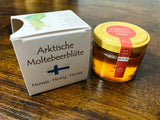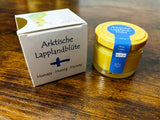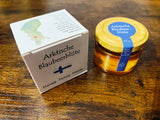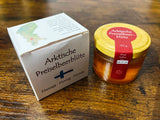On this website you can see rarely offered varieties of honey from Lapland. The vegetation in the Arctic Circle only has a short time to develop and the bees have to perform at their best to collect the nectar from flowers and herbs in the short flowering period from June to August. For this reason, beekeepers in the far north keep a different breed of honey bee than in Central Europe, namely the much more frugal and very hardy dark bee (Apis mellifera mellifera). It is smaller than a conventional Carnica honey bee and better adapted to the harsh climatic conditions.
At times we can offer you Arctic honey in the following varieties:
- Arctic cloudberry blossom honey: This extremely rarely offered honey comes from the town of Ranua in southern Lapland. This Nordic berry species is not found in Austria and Switzerland, nor in southern and central Germany. The cloudberry is best known as an image on Finnish 2 euro coins, as well as an iconic symbol of Lapland. The berry species only reaches a low growth height and the fruits are visually reminiscent of blackberries. The honey itself is light and clear. It is sweet as blossom honey should be and it crystallizes quickly in the glass
- Arctic lingonberry blossom honey: This exotic variety of honey comes from an apiary near Sodankylä in central Lapland. Unlike the cloudberry, which is native to meadows, lingonberries grow on the forest floor, often protected by bushes and trees. Although the forest floor is sometimes densely covered with lingonberries, the beekeeper cannot count on a bountiful harvest every year. Unfortunately, total failures due to weather are common. The honey itself has the typical color of blossom honey. It is clear and liquid after harvest, but it quickly crystallizes in the glass.
- Arctic blueberry blossom honey: The blueberry is better known as the bilberry in Central Europe. The wild form prefers northern and shady places. It feels very comfortable in regions with few species and in coniferous forests. The wild berry variant has almost nothing in common with the berries we buy in the supermarket. This honey comes from bees that live on the shores of Lake Orajärvi. The deserted area in Eastern Lapland is the ideal breeding ground for lush blueberry growth. Like many other types of honey, the blueberry crystallizes quickly in the glass. The taste is fine, sweet with a hint of caramel and should satisfy even the most discerning palates.
- Arctic Lapland blossom honey: This honey comes from an apiary beyond the Arctic Circle. It is probably the northernmost point on earth where bees can still be kept. Due to the very short vegetation and the harsh climate, the beekeeper can expect an annual yield of only around 2 kg of honey (!) per bee colony. More is not possible at this latitude. This makes Lapland honey probably the northernmost honey in the world and at the same time one of the rarest types of honey.
70 g in a glass jar at 18.90 EUR; basic price 100 g = 27.00 EUR
Manufacturer: Hanse Honig, Germany and Sweden
- Order with free in-store pickup from Tuesday to Friday. Please note the opening hours . Address: Welthonig im Rabenhof, Hainburger Straße 68-70/45/1, 1030 Vienna
- We ship daily and promptly after receipt of payment from Tuesday to Friday. Customers can choose between private delivery services such as DPD, GLS, and Hermes, as well as Austrian Post. You can find all the information in our shipping rates .


- [paused] Order and same-day delivery in Vienna. Operated by Veloce Botendienste GmbH. Orders placed in the evening and on weekends will be processed as quickly as possible on the next business day.

- Secure online payment with SSL encryption: Credit card (Mastercard, Visa, American Express), Klarna, and eps bank transfer. Swiss customers can pay directly in CHF without having to exchange. Customers in Canada can also pay directly in CAD without having to exchange. Customers in the US can also pay directly in USD without having to exchange.
- Offline payment without a card with a traditional bank transfer to the company's bank account (prepayment). After receipt of payment, the goods are packaged and shipped.








